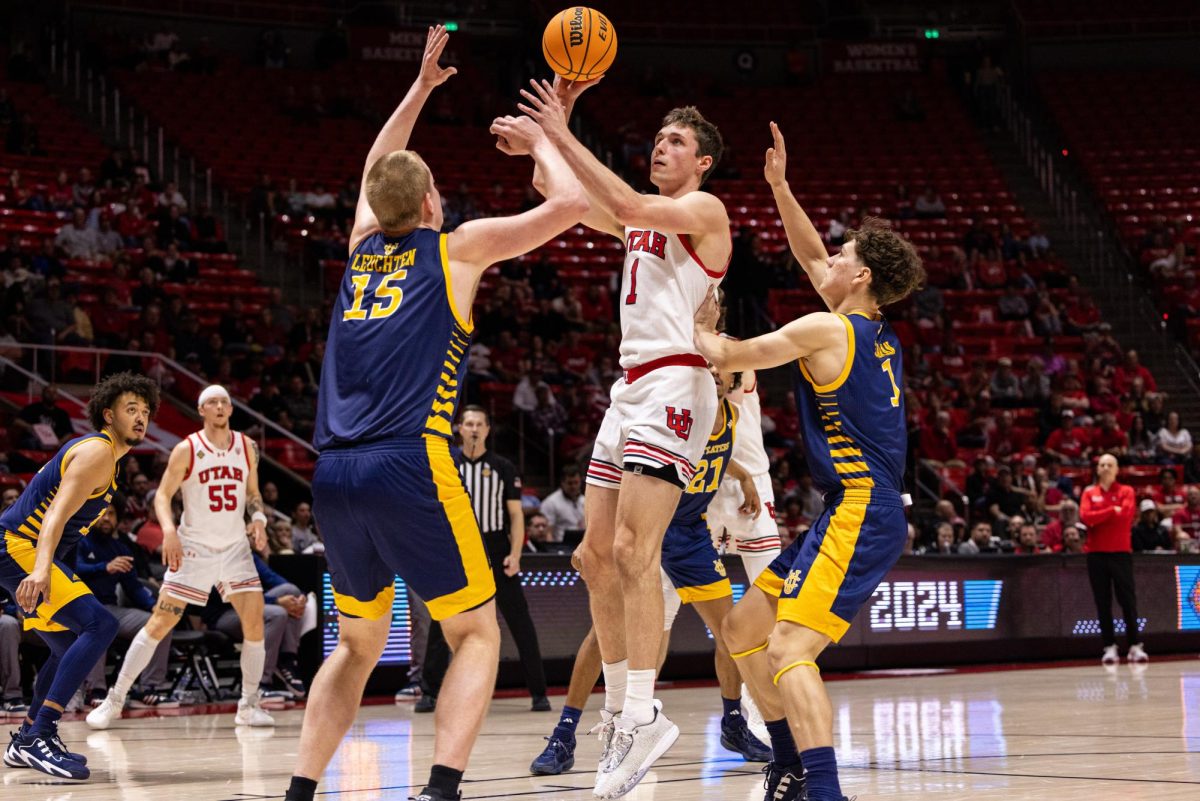When Runnin’ Ute Kyle Kuzma visited his hometown of Flint, Mich. this past May for about 10 days, he noticed a rash was developing on his stomach and it wasn’t even something that came as a shock to the junior.
Before going home, Kuzma had spoken to his family and a few of his friends from the Flint area and they cautioned him about what was going on. When the rashes started to appear, it was something he expected, something he knew was bound to happen as a result of taking a few showers — and being exposed to the lead-contaminated water the entire city of Flint has been plagued with for nearly three years.
“I don’t think it took me by surprise, because I already knew the whole ordeal,” Kuzma said. “Some of my friends’ water was brown or it was coming out yellow. It’s a rough thing, but the rashes, I knew you could get that from it, so it was just like, ‘Hey, you’ve gone through it now.’”
HISTORY
In an effort to save money, the city of Flint opted to stop receiving water from Lake Huron and instead turned to the Flint River in April of 2014. However, Citizens had concerns seven years prior to the switch.
In 2007, Flint started to use the Flint River as a backup water supplier. Though the government stated the water would be fine, some citizens were not so sure. They raised worries about possible contamination. According to The Flint Journal in 2007, the river had a reputation “where untreated sewage sometimes spill[ed] and dead bodies occasionally turn[ed] up.”
Fast forward to 2012, when Flint started to cut costs. The city found that it would be cheaper to use the Karegnondi Water Authority (KWA) instead of the Detroit Water and Sewerage Department (DWSD). A little more than a year later in 2013, Flint decided to officially end its contract with the DWSD and planned to switch over to the KWA the next year.
April 25, 2014 marked the day of the transition, which makes the day before — April 24, 2014 — the last day the citizens of Flint had clean drinking water coming from their faucets.
Four months after the switch, the city issued a boil water advisory, because fecal coliform bact erium was discovered in the water. Not even a week later the advisory was lifted. However, another one was issued two weeks after that. This time, total coliform bacterium had been found.
erium was discovered in the water. Not even a week later the advisory was lifted. However, another one was issued two weeks after that. This time, total coliform bacterium had been found.
LeAnne Walters, a mother of four, noticed there was something unusual in the water. The water was all sorts of colors — brown, light yellow, gray — and she worried it was causing her kids to become sick. One of her children stopped growing and the entire family dealt with hair loss and abdominal pain. Walters contacted the Environmental Protection Agency (EPA). What she received back confirmed her fears.
The EPA has a limit of 15 parts per billion (ppb) of lead. When Walters’ water was tested in February of 2015, it showed 104 ppb. Not even a full month later, more testing showed it had raised to 397 ppb. A couple of months later in June, it had gone up to 13,200 ppb — and the EPA considers 5,000 ppb of lead to be toxic waste.
And as of Jan. 31, 2017, the AP reported about 1,7000 Flint residents are suing the EPA for $700 million for how it has handled the water crisis.
SOMETHING OFTEN OVERLOOKED
Most people don’t even think twice about water — it just seems like it’s always there. It’s a clearly a different story in Flint, however.
People have to go out of their way to get bottled water when they should instead be able to receive clean water straight from their faucets. The government has issued filters, but according to Kuzma, it does hardly anything to lower the amount of lead. When he last visited home, using bottled water for showering wasn’t really an option. He knew he was going to experience some sort of side effect — an eventual rash — and he knew it was going to be something he would have to deal with.
 “It’s tough to think about you having to use water for everything you really don’t think about,” Kuzma said. “You got to brush your teeth? Well you can’t use that water so you have to have a bottle of water right by the sink. To cook food you got to used bottled water. Even drinking it, and giving it to your pets — you don’t want to give your pets lead-poisoned water. And of course showers, so you have to tough it out.”
“It’s tough to think about you having to use water for everything you really don’t think about,” Kuzma said. “You got to brush your teeth? Well you can’t use that water so you have to have a bottle of water right by the sink. To cook food you got to used bottled water. Even drinking it, and giving it to your pets — you don’t want to give your pets lead-poisoned water. And of course showers, so you have to tough it out.”
Kuzma’s thinking resembles that of his mother.
When the water crisis first began, Karri Kuzma, Kyle’s mom, was somewhat bothered by the fact that she not only had to drive to get water, but that she could only pick up one or two cases each time she visited a place that was distributing water. She’s now able to pick up about 10 or even 20 cases and it has become so routine that once there are about two cases left in her garage, it’s just another thing on her to-do list.
“It’s been going on for so long and nothing’s really changed,” Karri said. “You would think something would’ve been done, but it’s really the same. We still have to cook with bottled water and even though it’s free, it’s a pain to go pick up and nothing is fixed.”
BASKETBALL AS AN ESCAPE
Aside from the recent water crisis, Flint has more than 41 percent of its population living below the poverty level.
Kyle says growing up in a city like Flint was difficult. The opportunities to make it out are few and far between and, for Kyle, that outlet was basketball, but options were limited.
Kyle thinks there are really only three viable options for making it out of Flint.
“It’s either go to school, get good grades and go to college, or play a sport and go to coll ege, or we have a lot of rappers within the city, because those are the only main outlets you can get to,” Kyle said. “If you don’t go through them you’re probably in the streets, and I’ve had a lot of friends in the street go to jail, and even die because of being in the streets.”
ege, or we have a lot of rappers within the city, because those are the only main outlets you can get to,” Kyle said. “If you don’t go through them you’re probably in the streets, and I’ve had a lot of friends in the street go to jail, and even die because of being in the streets.”
Coming to Utah has changed his life for the better and his mother is proud of what he has been able to accomplish.
Karri remembers when Kyle was young he was constantly at the Y practicing basketball, working on his game — something he still does to this day even when the Utah basketball team is given time off. She has gotten pretty used to seeing Kyle playing on television, but what she loves most is when she is able to visit Salt Lake City, when she can really see how her son is making a name for himself.
Often times the two will go out to eat and almost instantly someone will recognize Kyle. When she was able to be a part of the Utah crowd over this past Thanksgiving weekend, she was in awe of her surroundings.
“Everybody is just cheering and yelling for Kuzma and I know they’re there for the entire team, but still I’m like, ‘These people love him,’” Karri said. “In my mind I think, ‘All these people come to see Kyle and all the players,’ and for me it was such a surreal moment — they’re here to see my son. They love my son.”
While some parents are emotional when their children leave home for college, Karri was happy that Kyle was going somewhere better. Though she was sad that she wouldn’t be able to see him on a daily basis, she was relieved knowing her son would be “safer” somewhere else.
Kyle is appreciative of his life in Utah.
“It’s just a blessing that you can get out of that environment, better your life and see that there’s more to life than violence and crime,” Kuzma said. “That’s like taboo out here — if you hear somebody gets shot, everyone freaks out, but back home, it’s every day — it’s a current.”
WORK LEFT TO BE DONE
The water crisis isn’t over, and although plenty of celebrities voiced their concerns early on, the noise has fizzled out and there is still work to be done.
 “You used to hear about 50 Cent donating water or Cher donating water — you used to hear that when it first started, but now it’s like you don’t hear about anybody donating anything,” Karri said. “It was for a minute, and now it’s forgotten and no problem has been fixed yet.”
“You used to hear about 50 Cent donating water or Cher donating water — you used to hear that when it first started, but now it’s like you don’t hear about anybody donating anything,” Karri said. “It was for a minute, and now it’s forgotten and no problem has been fixed yet.”
Lifetime recently announced they were going to film a movie about the Flint water crisis starring Cher, and it received a lot of backlash on social media for being insensitive. People thought that it was disrespectful of the company to make a movie about an issue that has yet to be resolved. Kyle saw both the positive and the negatives to it.
Kyle thinks it could help bring back more awareness to crisis, but he acknowledges the insensitive part as well, in a sense that people could just be looking to make a profit from it. Although Kyle is removed from Flint, he does realize the power he has being a starter for a Pac-12 basketball team, and he’ll continue to use his voice to make sure the people in his hometown aren’t another passing headline.
“It’s pretty limited what I can do, because I’m a college student with no money really — just a platform to gain awareness for people,” Kuzma said. “I’m always tweeting, or talking about Flint because it’s really dear to me and my heart, so that’s the only thing I can do until something presents itself for me.”
@kbrenneisen



















AllAboutWaterFilters • Apr 24, 2018 at 3:14 am
How can the government endanger the lives of people living in Flint? why cut the cost of something important to life? This is absurd.Then how can we trust the government to take care of us if the mere fact of giving clean water to the residents is taken for granted? If this is the case each resident should consider owning a water filter to take care of their drinking water and ensure safety in the water they drink
Betty Silchenstedt • Jul 16, 2017 at 5:14 pm
Great article that can educate readers how dangerous the water contamination is in Flint, and moreover that this is taking place in the USA.